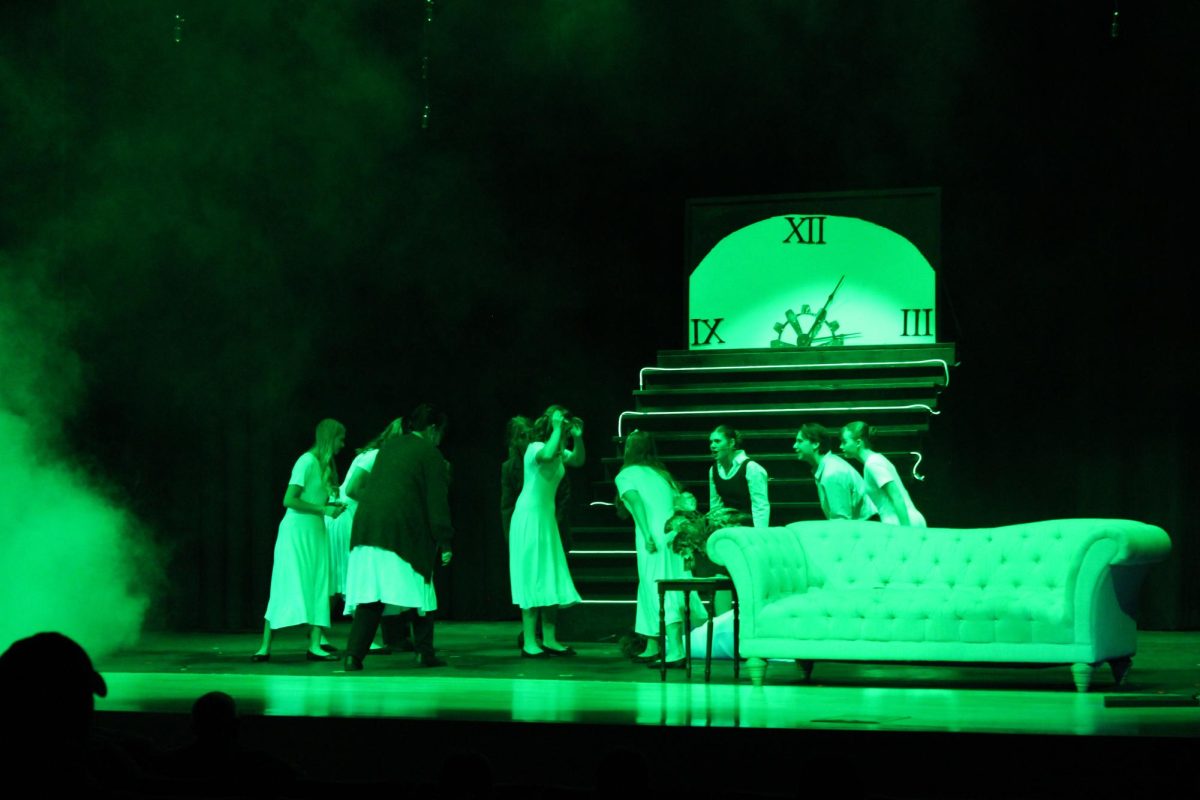Eaton Theatre’s fall play featured a mesmerizing story of strength, courage, and bravery. Director Kendra Hixon and the cast chose Radium Girls by D.W. Gregory.
Many EHS students involved in the theatre class took to the stage to share their love for acting love with the community. This particular show was based on the historical fiction of the story of factory girls, whose health had slowly declined from their work in radium factories.
The story takes place during the 1920s-1940s and follows the true story of female laborers who were poisoned and killed by their factory’s radium-based paint. The bulk of the narrative is based on events during the 1940s in New Jersey.
The occurrences led to the girls filing a lawsuit against the US Radium Corporation. During the lawsuit, there was no knowledge of radium actually being harmful, but the corporation did not make it easy and sought to manipulate the information about radium as research advanced.
The girls’ work helped to create worker’s rights today and the development of the Occupational Safety and Health Administration (OSHA). The play was performed in honor of the young radium girls.
The cast contained Ryann Wenck (25), Lannie Vallejos (25), Georgia Cross (27), Remi Grasmick (25), Skylinn Ferrell (27), Alexa Fischer (27), John Taggart (26), Shelby Maguire (27), Madalyn Joseph (26), Michael Huffman-Orange (25), Zoey Hall (27), and Elijah Deatrick (27) performed for EHS Nov. 14-16.
The production opened up with the scene of the factory girls working and the change of leadership from Dr. Von Sochocky (Shelby Maguire) to Arthur Rhoeder (John Taggart). The following scenes of the rest of the production captured audiences and told an important story of society.
In the 1920s and throughout war-time, working conditions were extremely poor and awareness was seldomly brought to the forefront of society. The story told within Radium Girls highlights the industrialization and placement of importance on capitalism in the US.
This often led to the ignorance of working conditions and the care of the working class. This changed throughout the 1950s and 60s and the story of the Radium Girls is an important one to carry on in the present.
Wenck was given the opportunity for the lead role in the play as Grace Fryer. Her emotion and passion were felt throughout the play, with each line she delivered. “It took a lot of time practicing with many different people, and with my character portraying a real life hero it was important for me to show her strength and be in the moment. I loved this play and the story that goes along with it,” said Wenck.
Fryer played a key role in the presentation of the show as she battled with the radium corporation and became face-to-face with death as her health slowly deteriorated. The raw emotion and truth presented during the show compelled audiences and highlighted the true importance of “Radium Girls.”
Director Kendra Hixon said, “I’m so beyond proud of my cast and crew. It was a tech-heavy show and probably the most serious we’ve ever done and they did fantastic work with both. I’ve not done a historic fiction show before and was thrilled how well they took on these real people and told their stories well.”
A lot of work goes into the production of these plays and involves the cast, crew, director, and community. The show concluded with one of the most meaningful and memorable lines given by Taggart.
The concluding scene follows Fryer as she arrives at one of her peer’s graves who died from radium poisoning. The president of US Radium Corporation, played by Taggart, looks back on the decisions he made while serving as the president of the corporation.
While unbeknownst to him, radium was extremely harmful, and when his knowledge of these damaging effects evolved he chose to take aggressive action to hide and manipulate the information to keep his company afloat.
Taggart looks back on the years and delivers the line, “I never even saw their faces.” The line carried extreme depth and emotion and outlined the fact that although the girls did work for him, he chose to ignore their well-being and focus on the production of money.
Overall, the production marked the first time Hixon attempted to present a historical fiction play. The results of the attempt were positive and demonstrated the passion that the cast and crew were able to express to the audience of Eaton.










